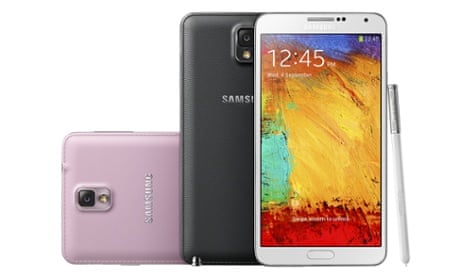Several years ago, riding on the subway in Hong Kong, I noticed at least three people nearby who were looking at some unusual mobile screens. Their devices were larger than any phone I'd seen, but smaller than a 7-inch tablet. Awkward, I thought; that's not for me.
I was wrong. The devices I'd seen were already becoming popular in Asia, and now they're making serious inroads in other parts of the world, including America. Today I carry a "phablet" – a combination phone and tablet – a Samsung Galaxy Note 3, and it's better for this road warrior than anything I've used before.
The Note 3, and its Note 2 predecessor, replaced two devices I'd previously carried: a phone and a tablet. I still use several tablets at home but they don't leave the house anymore, because the Note 3 combines most of the features I need when I'm on the go. Beyond occasional phone calls, they include catching up with email, web browsing, watching videos, and reading books.
Apple's iPhone may still be the slickest combination of hardware and software in the mobile market, though Android phones have grown vastly more sophisticated and easy to use. But Apple has resolutely declined to compete in one arena where the competition is kicking butt: size. While Apple tops out with a 4-inch screen, Samsung and the other phone makers are producing that lots of customers want: a bigger phone that can double, in some cases, as a small tablet.
The Note 3 has a superb 5.7-inch display and other components and features – including a pen-stylus that works smoothly – packed into a thin device that weighs a surprisingly light 167 grams. It's not perfect, but it's plainly the best of its breed so far.
Along the way, Samsung and other smart-phone makers have adopted many of the iPhone's original features, even as they've advanced the genre in ways Apple has yet to emulate itself. Apple has used America's grotesquely warped patent
system to wage war in courts as much as the market, and it was back in court this week, pursuing its patent war against Android device makers. A hometown jury awarded the California company an additional $290m in damages in a long-running case against Samsung for patent violations that never made much sense to me.
I'm not a fan of Samsung's too-often bad behavior, including its willingness to play fast and loose with benchmarks that made the Note 3 look even better than it actually is. But Apple's ongoing patent jihad is a sand-in-the-gears strategy in a marketplace
where the system has created impossible complexity that encourages the wrong kind of competition – and it's just what a dominant players and trolls alike can use for their own ends. Increasingly, the patent system's complexity has less to do with actual innovation than slowing it down.
Innovation isn't just the giant breakthroughs, as some of Apple's devices certainly have been. It's the relentless, incremental improvements and tweaks that, over time, provide us with better and better devices. By that standard, the larger phones/phablets are innovations, too. Of course, size only gets you so far; Samsung sells and even larger phone with a 6.3-inch screen, and it's not nearly as well equipped as the smaller Note 3; I'd call it almost retrograde.
Apple remains, as well, resolute in its wish to control how customers can use their devices. By restricting the sale of apps solely to its own store; by its sometimes heavy-handed treatment of third-party developers; and by any number of other actions over the years, the company has made it clear that it wants users of its products to enter a restrictive, if alluring, ecosystem that can be hard to leave.
Here, too, Android offers advantages to those who want control over their own devices – even though Google has itself been ratcheting up levels of control. But Samsung is also trying to create an Apple-like ecosystem, which in the end seems more designed to improve Samsung's fortunes than its customers'. This is why I'm planning to install a third-party, truly open-source version of the Android operating system replacement as soon as a stable one emerges; yes, I'll likely lose some functionality the Note 3 offers today, but I'll gain more actual control over the expensive gadget I've purchased.
I was sure, when I bought one of the earliest 7-inch tablets, that Apple would eventually move in that direction despite the late Steve Jobs' insistence that the original iPad's size was the way it absolutely had to be. Likewise, I'm sure Apple will eventually come out with a phablet-sized device. It just makes too much sense.
And when that happens, some of the iPhone users who snicker today at phablets will be trumpeting the virtues of Apple's latest products, and they'll be exclaiming how innovative it all is. I'll agree with them on the first part.
